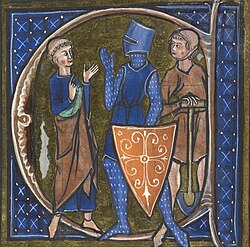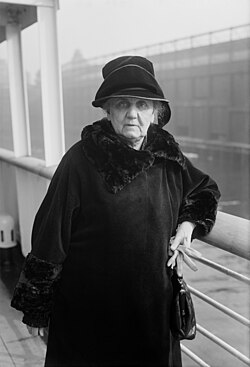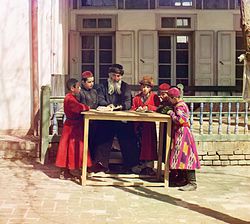
Back Portal:Gsellschaft GSW بوابة:مجتمع Arabic Портал:ЖамгӀият AV Портал:Йәмғиәт Bashkir Portal:Gsööschoft BAR Партал:Грамадзтва BE-TARASK Portal:Masyarakat BTM Portal:Societat Catalan Ков:Йукъаралла CE Ganghaan:Katilingban CEB
The Society Portal
A society (/səˈsaɪəti/) is a group of individuals involved in persistent social interaction or a large social group sharing the same spatial or social territory, typically subject to the same political authority and dominant cultural expectations. Societies are characterized by patterns of relationships (social relations) between individuals who share a distinctive culture and institutions; a given society may be described as the sum total of such relationships among its constituent members.
Human social structures are complex and highly cooperative, featuring the specialization of labor via social roles. Societies construct roles and other patterns of behavior by deeming certain actions or concepts acceptable or unacceptable—these expectations around behavior within a given society are known as societal norms. So far as it is collaborative, a society can enable its members to benefit in ways that would otherwise be difficult on an individual basis.
Societies vary based on level of technology and type of economic activity. Larger societies with larger food surpluses often exhibit stratification or dominance patterns. Societies can have many different forms of government, various ways of understanding kinship, and different gender roles. Human behavior varies immensely between different societies; humans shape society, but society in turn shapes human beings. (Full article...)
Selected article
Featured picture
The climactic scene from Act III of The Wicked World (1873), a blank verse play by W. S. Gilbert about how female fairies cope with a sudden introduction to them of men and "mortal love". This is one of several "fairy comedies" by Gilbert, and it established him as a writer of wide range, propelling him beyond the burlesques he had produced in his early career, and leading towards his famous Savoy operas.
Did you know...
- ... that emaciation (pictured) is referred to as "shosha roga" in India, where more than 200 million people are affected by malnutrition?
- ... that the Prison Officers Association threatened a job action when it was announced that both Birmingham and Oakwood Prisons were to be contracted to security company G4S?
- ... that Albanian philosopher and poet Arshi Pipa was imprisoned for ten years because he antagonized the communist regime in Albania with his recitation of a verse by Goethe?
Anniversaries this month
- 2 August 2009 - The Guernsey Literary and Potato Peel Pie Society reached The New York Times Best Seller list
- 17 August 2011 - Organization of the Outdoor Co-ed Topless Pulp Fiction Appreciation Society
- 24 August 1963 - Malaysian Red Crescent Society admitted as a member of the League of Red Cross Societies
Selected quote
Selected biography
Featured audio
Categories
Related portals
Recognized content
Featured articles
 2012 phenomenon
2012 phenomenon Chinua Achebe
Chinua Achebe Alodia
Alodia Amazing Grace
Amazing Grace Amphetamine
Amphetamine Ancient Egyptian literature
Ancient Egyptian literature Archaeology, Anthropology, and Interstellar Communication
Archaeology, Anthropology, and Interstellar Communication Badnjak (Serbian)
Badnjak (Serbian) 1740 Batavia massacre
1740 Batavia massacre 1689 Boston revolt
1689 Boston revolt Communication
Communication 1969 Curaçao uprising
1969 Curaçao uprising Diocletianic Persecution
Diocletianic Persecution W. E. B. Du Bois
W. E. B. Du Bois Female genital mutilation
Female genital mutilation First homosexual movement
First homosexual movement Johann Reinhold Forster
Johann Reinhold Forster From the Doctor to My Son Thomas
From the Doctor to My Son Thomas Fuck (2005 film)
Fuck (2005 film) Fuck: Word Taboo and Protecting Our First Amendment Liberties
Fuck: Word Taboo and Protecting Our First Amendment Liberties Growing Up Absurd
Growing Up Absurd Eric A. Havelock
Eric A. Havelock History
History Homeric Hymns
Homeric Hymns Homo antecessor
Homo antecessor Huia
Huia 1981 Irish hunger strike
1981 Irish hunger strike Jovan Vladimir
Jovan Vladimir Jomo Kenyatta
Jomo Kenyatta Kharijites
Kharijites Christopher C. Kraft Jr.
Christopher C. Kraft Jr. Theodora Kroeber
Theodora Kroeber Levantine Arabic
Levantine Arabic Glynn Lunney
Glynn Lunney Mantis
Mantis Mayan languages
Mayan languages Ole Miss riot of 1962
Ole Miss riot of 1962 Parthian Empire
Parthian Empire Peasants' Revolt
Peasants' Revolt Solo Man
Solo Man Jean-Joseph Rabearivelo
Jean-Joseph Rabearivelo Rosewood massacre
Rosewood massacre Sair Tjerita Siti Akbari
Sair Tjerita Siti Akbari Sayfo
Sayfo Si Ronda
Si Ronda St Scholastica Day riot
St Scholastica Day riot Stonewall riots
Stonewall riots Subfossil lemur
Subfossil lemur Torture
Torture Tutupaca
Tutupaca Veiqia
Veiqia George Washington and slavery
George Washington and slavery
Featured lists
Good articles
 1950s American automobile culture
1950s American automobile culture Timeline of the Egyptian revolution of 2011
Timeline of the Egyptian revolution of 2011 2023 Serbian election protests
2023 Serbian election protests Abolitionist Place
Abolitionist Place Chimamanda Ngozi Adichie
Chimamanda Ngozi Adichie Agriculture
Agriculture Chakh Akhriev
Chakh Akhriev Akure–Benin War
Akure–Benin War Alfred Kroeber: A Personal Configuration
Alfred Kroeber: A Personal Configuration Algorithmic bias
Algorithmic bias America's 60 Families
America's 60 Families Anarchism
Anarchism Anarchism in Cuba
Anarchism in Cuba Victor Henry Anderson
Victor Henry Anderson Andriamanelo
Andriamanelo Andriamasinavalona
Andriamasinavalona Anonymous (hacker group)
Anonymous (hacker group) Anti-nuclear movement in Australia
Anti-nuclear movement in Australia Anna Apostolaki
Anna Apostolaki Religion in pre-Islamic Arabia
Religion in pre-Islamic Arabia Architecture of the Song dynasty
Architecture of the Song dynasty The Archives of the Planet
The Archives of the Planet Aroused (film)
Aroused (film) Australopithecus africanus
Australopithecus africanus Australopithecus afarensis
Australopithecus afarensis Australopithecus bahrelghazali
Australopithecus bahrelghazali Australopithecus deyiremeda
Australopithecus deyiremeda Australopithecus garhi
Australopithecus garhi Australopithecus sediba
Australopithecus sediba Azerbaijan
Azerbaijan Bad Dürrenberg burial
Bad Dürrenberg burial Balangoda Man
Balangoda Man Banai (goddess)
Banai (goddess) Bani Zeid al-Gharbia
Bani Zeid al-Gharbia Barbad
Barbad Bede
Bede Before the Dawn (Wade book)
Before the Dawn (Wade book) Beowulf
Beowulf Hans Bethe
Hans Bethe Biblical criticism
Biblical criticism Birth control
Birth control Black Lives Matter
Black Lives Matter Boerehaat
Boerehaat The Bog People
The Bog People Bomis
Bomis Boobrie
Boobrie Boston Massacre
Boston Massacre Boys' love
Boys' love Tawana Brawley rape hoax
Tawana Brawley rape hoax Breton Ballads
Breton Ballads Bury St Edmunds witch trials
Bury St Edmunds witch trials Cagot
Cagot Catilinarian conspiracy
Catilinarian conspiracy Cueva de las Manos
Cueva de las Manos Celebrity Studies
Celebrity Studies Centre-right politics
Centre-right politics Hector Munro Chadwick
Hector Munro Chadwick S. J. V. Chelvanayakam
S. J. V. Chelvanayakam Child prostitution
Child prostitution Childhood nudity
Childhood nudity History of Christian thought on persecution and tolerance
History of Christian thought on persecution and tolerance Church Offensive
Church Offensive A Community of Witches
A Community of Witches Compulsory Miseducation
Compulsory Miseducation Coney Island
Coney Island Coon hunting
Coon hunting Copenhagen
Copenhagen Ion Creangă
Ion Creangă Criminalization of homosexuality
Criminalization of homosexuality Cro-Magnon
Cro-Magnon Cult film
Cult film Culture of the Song dynasty
Culture of the Song dynasty Cutting the Mustard
Cutting the Mustard Daju kingdom
Daju kingdom Hilda Ellis Davidson
Hilda Ellis Davidson Demographic history of Scotland
Demographic history of Scotland Demographics of the Supreme Court of the United States
Demographics of the Supreme Court of the United States Denisovan
Denisovan Deus Ex: Human Revolution
Deus Ex: Human Revolution Diaphoneme
Diaphoneme Dictator novel
Dictator novel Diver communications
Diver communications Dmanisi hominins
Dmanisi hominins Domestication
Domestication Double burden
Double burden Dreamtime (book)
Dreamtime (book) Émile Durkheim
Émile Durkheim EST and The Forum in popular culture
EST and The Forum in popular culture Edo literature
Edo literature Education
Education Elf
Elf Ely and Littleport riots of 1816
Ely and Littleport riots of 1816 Eskaya people
Eskaya people Extremely online
Extremely online Family in the United States
Family in the United States Kingdom of Fazughli
Kingdom of Fazughli Feminist economics
Feminist economics The finger
The finger Adrian S. Fisher
Adrian S. Fisher Forensic anthropology
Forensic anthropology Free Expression Policy Project
Free Expression Policy Project Stephen Fuchs
Stephen Fuchs Future of Families and Child Wellbeing Study
Future of Families and Child Wellbeing Study Garbage Offensive
Garbage Offensive Gender and sexual minorities in the Ottoman Empire
Gender and sexual minorities in the Ottoman Empire Genetically modified organism
Genetically modified organism Anca Giurchescu
Anca Giurchescu God's Choice
God's Choice Erving Goffman
Erving Goffman Paul Goodman
Paul Goodman Gwerz Skolan
Gwerz Skolan He-Man as a gay icon
He-Man as a gay icon Help Wanted (SpongeBob SquarePants)
Help Wanted (SpongeBob SquarePants) Herto Man
Herto Man Historiography of the Crusades
Historiography of the Crusades History of botany
History of botany History of Milton Keynes
History of Milton Keynes History of agriculture
History of agriculture Hitachi Magic Wand
Hitachi Magic Wand Winifred Hoernlé
Winifred Hoernlé Homo erectus
Homo erectus Homo rudolfensis
Homo rudolfensis Homo ergaster
Homo ergaster Homo habilis
Homo habilis Homo heidelbergensis
Homo heidelbergensis Homo longi
Homo longi Homo luzonensis
Homo luzonensis Homo naledi
Homo naledi Hooray Henry
Hooray Henry Human
Human Human history
Human history Human interactions with insects
Human interactions with insects I Ching
I Ching Igbo literature
Igbo literature Igbo people
Igbo people Globalization and women in China
Globalization and women in China Incel
Incel Ivatan people
Ivatan people 1968–1969 Japanese university protests
1968–1969 Japanese university protests Java Man
Java Man Jewellery of the Berber cultures
Jewellery of the Berber cultures Jews in the civil rights movement
Jews in the civil rights movement Joint custody (United States)
Joint custody (United States) Kabwe 1
Kabwe 1 Kalākaua
Kalākaua Kanak people
Kanak people 2008 attacks on Christians in southern Karnataka
2008 attacks on Christians in southern Karnataka KCOS (TV)
KCOS (TV) Kenyanthropus
Kenyanthropus Kīlauea
Kīlauea Kirkbride Plan
Kirkbride Plan Knowledge
Knowledge Korean mythology
Korean mythology Alan Kotok
Alan Kotok Kulintang
Kulintang LGBTQ and Wikipedia
LGBTQ and Wikipedia Language
Language Lantian Man
Lantian Man Ralph Larkin
Ralph Larkin Larries
Larries Latin American Boom
Latin American Boom Latin American Defense Organization
Latin American Defense Organization H. Rex Lee
H. Rex Lee Lesbian
Lesbian Life replacement narratives
Life replacement narratives Liliʻuokalani
Liliʻuokalani Literature of Botswana
Literature of Botswana Luttra Woman
Luttra Woman Sorley MacLean
Sorley MacLean Magic, Witchcraft and the Otherworld
Magic, Witchcraft and the Otherworld Malagasy hippopotamus
Malagasy hippopotamus Bronisław Malinowski
Bronisław Malinowski The Man-Eating Myth
The Man-Eating Myth Man of the Hole
Man of the Hole March for Our Lives Portland
March for Our Lives Portland March for Science Portland
March for Science Portland March of loyalty to martyrs
March of loyalty to martyrs Prince Marko
Prince Marko Marriage in the United Arab Emirates
Marriage in the United Arab Emirates Karl Marx
Karl Marx Mengdu
Mengdu Josef Mengele
Josef Mengele Methamphetamine
Methamphetamine Maria Mies
Maria Mies Misanthropy
Misanthropy Models of communication
Models of communication A More Perfect Union: Advancing New American Rights
A More Perfect Union: Advancing New American Rights Mork Goes Erk
Mork Goes Erk Mountain Meadows Massacre
Mountain Meadows Massacre Music in early modern Scotland
Music in early modern Scotland Music of Sudan
Music of Sudan Myth of the clean Wehrmacht
Myth of the clean Wehrmacht George Naʻea
George Naʻea Native American mascot controversy
Native American mascot controversy Neanderthal
Neanderthal The Neanderthals Rediscovered
The Neanderthals Rediscovered Robert Alexander Neil
Robert Alexander Neil Birger Nerman
Birger Nerman New World Order conspiracy theory
New World Order conspiracy theory New Zealand literature
New Zealand literature Hal Newhouser
Hal Newhouser No Lifeguard on Duty
No Lifeguard on Duty Autonomous Republic of Northern Epirus
Autonomous Republic of Northern Epirus Not My Presidents Day
Not My Presidents Day Not in Front of the Children
Not in Front of the Children Nudity
Nudity Observations Made During a Voyage Round the World
Observations Made During a Voyage Round the World Odyssey
Odyssey Ohlone
Ohlone On the Internet, nobody knows you're a dog
On the Internet, nobody knows you're a dog On the Pulse of Morning
On the Pulse of Morning Otaku
Otaku Paranthropus
Paranthropus Paranthropus aethiopicus
Paranthropus aethiopicus Paranthropus boisei
Paranthropus boisei Paranthropus robustus
Paranthropus robustus Adam Parry
Adam Parry Peking Man
Peking Man Mau Piailug
Mau Piailug Bajo Pivljanin
Bajo Pivljanin Poetry in The Lord of the Rings
Poetry in The Lord of the Rings Political party
Political party Polyethnicity
Polyethnicity Positioning theory
Positioning theory Potential cultural impact of extraterrestrial contact
Potential cultural impact of extraterrestrial contact Poverty in ancient Rome
Poverty in ancient Rome 1956 Poznań protests
1956 Poznań protests Pratapgarh Kingdom
Pratapgarh Kingdom Protests in Canada against the Sri Lankan civil war
Protests in Canada against the Sri Lankan civil war Proto-globalization
Proto-globalization Psychedelic music
Psychedelic music Iveta Radičová
Iveta Radičová Rally to Restore Sanity and/or Fear
Rally to Restore Sanity and/or Fear Aparna Rao
Aparna Rao A Rape on Campus
A Rape on Campus Reborn doll
Reborn doll Herbert Hope Risley
Herbert Hope Risley The Road to Total Freedom
The Road to Total Freedom Romania in the Early Middle Ages
Romania in the Early Middle Ages Rose Street Club
Rose Street Club Royal intermarriage
Royal intermarriage Edward Said
Edward Said Samgong bon-puri
Samgong bon-puri Sarawak
Sarawak Savika
Savika Saxe–Goldstein hypothesis
Saxe–Goldstein hypothesis Schramm's model of communication
Schramm's model of communication Seattle Fault
Seattle Fault Sex, Sin, and Blasphemy
Sex, Sin, and Blasphemy Idries Shah
Idries Shah Sheng nü
Sheng nü Si Prat
Si Prat Silver
Silver Sima de los Huesos hominins
Sima de los Huesos hominins Maria Simon (sociologist)
Maria Simon (sociologist) Choor Singh
Choor Singh Kateryna Skarzhynska
Kateryna Skarzhynska Slavery in Haiti
Slavery in Haiti Social identity theory
Social identity theory Society
Society Sociology of leisure
Sociology of leisure Source–message–channel–receiver model of communication
Source–message–channel–receiver model of communication Stay-at-home dad
Stay-at-home dad Stikine River
Stikine River Stratford Dialectical and Radical Club
Stratford Dialectical and Radical Club Sudanese literature
Sudanese literature Syrian literature
Syrian literature Tautavel Man
Tautavel Man Team effectiveness
Team effectiveness Tefillin
Tefillin Theory of Literature
Theory of Literature Think of the children
Think of the children Thus have I heard
Thus have I heard Tolkien and the modernists
Tolkien and the modernists Trance and Dance in Bali
Trance and Dance in Bali Truce term
Truce term Uncommitted National Movement
Uncommitted National Movement Upanishads
Upanishads Wales
Wales Max Weber
Max Weber Weiquan movement
Weiquan movement Well-being
Well-being Welsh cuisine
Welsh cuisine When a man argues against two beautiful ladies like this, they are going to have the last word
When a man argues against two beautiful ladies like this, they are going to have the last word Whiskey Rebellion
Whiskey Rebellion Who We Are and How We Got Here
Who We Are and How We Got Here Benjamin Lee Whorf
Benjamin Lee Whorf Widener Library
Widener Library Eugene Wigner
Eugene Wigner Henry Winkler
Henry Winkler Witch hunts in India
Witch hunts in India Women of the Young Lords
Women of the Young Lords Women's March on Portland
Women's March on Portland Yeren
Yeren Yuanmou Man
Yuanmou Man Yuri (genre)
Yuri (genre) Yusuf Meddah
Yusuf Meddah Evangelos Zappas
Evangelos Zappas Zhang Jingsheng
Zhang Jingsheng Florian Znaniecki
Florian Znaniecki
Featured pictures
-
20151030 Syrians and Iraq refugees arrive at Skala Sykamias Lesvos Greece 2
-
Bertillon, Alphonse, fiche anthropométrique recto-verso
-
Bust of Ibn Khaldun (Casbah of Bejaia, Algeria)
-
Chicago and Northwestern railroad locomotive shop fsac.1a34676u
-
Daisy (1964)
-
Dewey Defeats Truman
-
DurbanSign1989
-
Frances Benjamin Johnston, Self-Portrait (as "New Woman"), 1896
-
If you talk too much, this man may die
-
Jane Addams - Bain News Service
-
Jewish Children with their Teacher in Samarkand
-
Marine da nang
-
Nanook of the North
-
Sahelanthropus tchadensis - TM 266-01-060-1
-
SantaCruz-CuevaManos-P2210651b
-
Scourged back by McPherson & Oliver, 1863, retouched
-
Self portrait of Edward Sheriff Curtis
-
Thuong Duc, Vietnam - A Viet Cong prisoner awaits interrogation at the A-109 Special Forces Detachment in Thuong - NARA - 531447
-
US Marshals with Young Ruby Bridges on School Steps
-
United States President Barack Obama bends down to allow the son of a White House staff member to touch his head
-
W.E.B. Du Bois by James E. Purdy, 1907
-
Xiahe mandible
Things you can do
 |
Here are some tasks awaiting attention:
|
WikiProjects
Web resources
- Definition of Society from the OED.
- Internet Modern History Sourcebook: Industrial Revolution
- "The Day the World Took Off" Six part video series from the University of Cambridge tracing the question "Why did the Industrial Revolution begin when and where it did."
- BBC History Home Page – Industrial Revolution
- National Museum of Science and Industry website – machines and personalities
- Industrial Revolution and the Standard of Living by Clark Nardinelli - the debate over whether standards of living rose or fell.





































